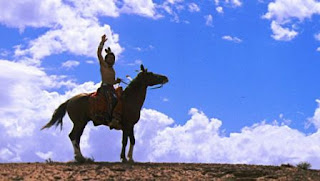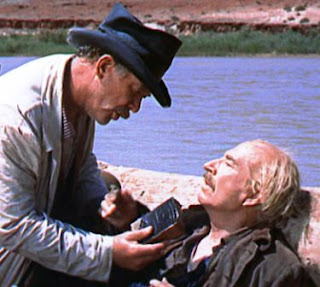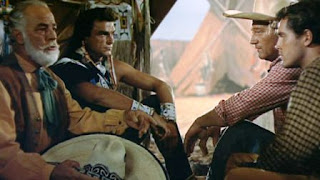Totally bizarre that my posts showed up out of order!
It may be taboo, but I like the racial wrongs in westerns. My favorite movie is The Searchers, and it is such a weird mix of 19th century racism mixed with 50s segregation. Looking with a modern lense however, we can see this ideologies as wrong. What's wrong with having a show that shows history's ills?
It's a long review, but here's an excerpt from my thesis on The Searchers:
The Statements

Despite its wonderful cast and visuals,
The Searchers is not a western where the good guys where white hats and the bad boys are all in black. It’s reflections on racism, Manifest Destiny, and the Confederacy are clear enough to any modern viewer. From the first mention of Ethan’s allegiance to the South to Laurie’s final declaration that a bullet in Debbie’s brain is best, we know this picture says a lot more than most westerns or most of its McCarthy era compatriots. Not only commenting on its story material,
The Searchers also says a lot about its time. There are no black actors in sight-and I’m sure if I researched enough I could find out that surely there were real American Indians involved in the production. Nevertheless, you can’t see any of them onscreen. Painted white actors- Scar actor Henry Brandon was born in Germany!-portray the stereotypical feather headdress wearing Injuns, and the Mexicans offered all wear sombreros. Today
The Searchers doesn’t look dated; it simply looks like a film of its time that’s bravely commentating on a hundred years prior. Unfortunately, our nation’s true colors seem to have changed little in that time.

Like other John Ford pictures, The US Cavalry makes an appearance here. Instead of being the hero, however,
The Searchers offers a somewhat underhanded treatment of the Army. First the Cavalry and its Indian Agencies interfere with Ethan’s search and provide little help. Later, Lieutenant Greenhill is made out to be a dumb, spoiled boy who doesn’t know what he’s doing-and he and his bugler are the only significant Cavalrymen in the picture. Some viewers think a brief scene in which Captain Clayton has an undisclosed rear end injury is out of place; however, I think he was stuck in the butt with Greenhill’s sword. He’s warned earlier by Clayton to take care with his ‘knife’, and to me the butt wound represents the pain in the backside that Northern interference and reconstruction was to the still proud South.

Also seeming to rub the wrong way in
The Searchers is the juxtaposition of religion and violence. The local reverend is also the ranger captain for goodness sake, and he has no problem shouting Hallelujah after he’s shot a few Indians. Clayton also comments in the opening moments of the film that Debbie still isn’t baptized-does this mean she’s more susceptible to those Injun ways? Before a battle with Scar, Mose erroneously prays, ‘That which we are about to receive, we thank thee, oh Lord.’ Shortly thereafter, Martin has mixed feelings about his first Indian kill, but he quickly gets over it and continues firing. This observance of white hypocrisy parallels the relationship between Ethan and Scar, for both fights to avenge killed family. Ethan constantly refers to evil Bucks, non-human Comanche, scalping-he even shoots the eyes out of a dead Indian so the man will ‘wonder forever between the winds’.

Why don’t we think good of Scar-a man who has lost two sons-when he takes in a young and lost Debbie and raises her as his own? Are we to be pleased when Ethan scalps Scar? It’s not a question of if the situations were reversed, for in many ways Ethan and his Indian enemies are not that different. We’re supposed to like the white guys even if we know their ways are wrong and hate the Indians for their misunderstood violence. Although
The Searchers has a feel good ending, the getting there is uneasy, complex, and complicated. The irony is that Ethan hopes to find Debbie and return her to the Jorgensen’s homestead. It’s not even really her home, merely neighbors from when Debbie was five years old. We are given the impression that she’s better off with an unrelated white family than Indians who raised her as their own. It’s never even considered that she might be better off staying where she’s acclimated. In fact, it’s quite the opposite. Once Ethan sees Debbie as a full-fledged squaw, his sentiments that living as a Comanche isn’t worth the living are fulfilled.
http://ithinkthereforeireview.blogspot.com/2009/06/searchers-part-2.html
ETA: Oh hey, didn't think the pics would come up here, neat!






